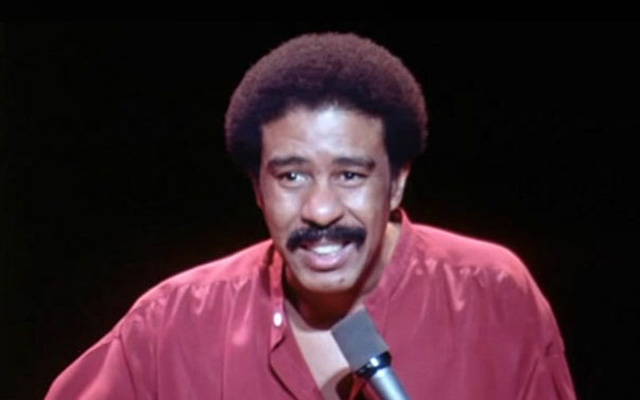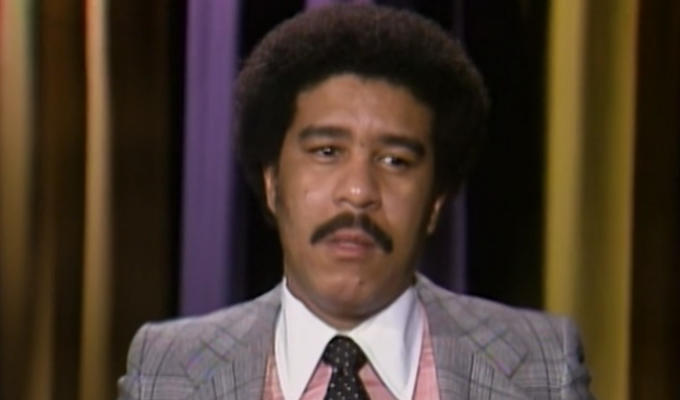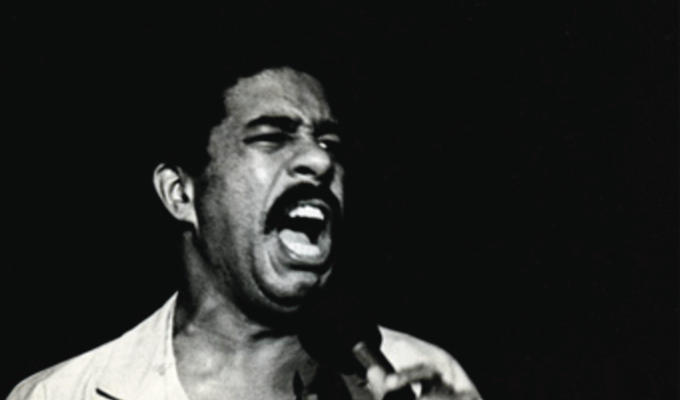
Richard Pryor
Date of birth: 01-12-1940Richard Pryor helped define modern stand-up; elevating it from an entertainment to an art with his unflinchingly frank use of his own life, however unflattering, into his coruscating routines.
And what a life it was - forever chasing women, money and drugs in a lifetime of addictive but unfulfilling hedonism that landed him in jail several times, and almost killed him when he set himself alight freebasing cocaine.
Born to a prostitute in his grandmother’s brothel in the ghettos ofPeoria Illinois, he grew up surrounded by performers and freaks. It was a tough area; he found a baby in a shoebox the street when he was seven years old and counted himself lucky that his family kept in.
In his autobiography, he reveals that a priest once ‘gave me a smooch on the lips… like a girlfriend’. His family conspired to encourage the abuse, in the hope of extorting a quick buck, until his fearsome grandmother put a stop to it.
Even more terrifyingly, a 17-year-old lad once threw Pryor against a wall in an alley and forced him to give him oral sex. He was six at the time.
His first professional performance came at the age of seven, when he played drums at a nightclub.
Pryor started as a mainstream storytelling comedian, inspired by the homely comedy of the hugely successful Bill Cosby – even though such a colourless approach hardly related to Pryor’s harsh reality amid the often murderous racial tensions bubbling in Peoria.
But it was enough earn a few bucks a night at the black-and-tan nightclubs – as venues with a mixed racial clientele were known –giving him a lifestyle that once would have been impossible to him.
'I made a lot of money being Bill Cosby,' he once recalled. 'But I was hiding my personality. I just wanted to be in show business so bad I didn't care how. It started bothering me - I was being a robot comic, repeating the same lines, getting the same laughs for the same jokes. The repetition was killing me.’
Surprisingly, it was Groucho Marx who brought this home, telling Pryor at a party: ‘Do you want a career you’re proud of, or do you want to end up a spitting wad like Jerry Lewis?’ The words made Pryor realise he was ‘pimping his talent like a cheap whore’, and in 1969, he had a crisis of confidence, abandoning a Las Vegas stage mid-set, saying: 'What the fuck am I doing here?".
He moved to Berkeley, California, and joined the hippies, radicals, bohemains and drug dealers, all the while exploring his attitude to life and to comedy - reclaiming the word nigger and talking with scabrous honesty about everything important to him
Although Pryor spoke frankly about his experiences as a black man in a racially divided America, he was never defined purely by his colour. Almost every stand-up of any skill of the past 30 years has been directly or indirectly influenced by the honesty he brought to the art.
His routines, naturally enough, offended conservative America with their subject matter and their uncompromising language – though he stopped using word 'nigger' in his shows following a trip to Zimbabwe. 'There are no niggers here,' he wrote. 'The people here, they still have their self-respect, their pride.'
He married seven times - twice to Flynn BeLaine and twice to his widow Jennifer who nursed him through his last years. And in 1980, he set himself on fire while freebasing cocaine at home. In a paranoid, hallucinogenic haze, he doused himself with a bottle of cognac and lit it. Flames lapping every inch of his body, he leapt out of a window and ran through the streets, his flesh burning up. His eventual, possibly miraculous, recovery from the 50 per cent burns to his body was long and painful.
In 1974, Pryor was sentenced to three years' probation for tax offences, and in 1978, he fired shots into his wife’s car, an incident which he turned into one of his finest stand-up routines.
But against all the social rhetoric, he could also talk of more mundane matters, such as his love of animals. In his later years, he became a spokesman for animal rights group Petra.
He appeared in several films including Stir Crazy, Superman III, Brewster's Millions and See No Evil, Hear No Evil - but he was always at his most electrifying live. Of his sometimes dubious film roles he said: 'I'm sorry, but they offered us the money. I was a pig, I got greedy.’
Pryor had been lined up to play the sheriff in Blazing Saddles, which he co-wrote with Mel Brooks, but the film's backers shied away from his controversial reputation and he lost the role to Cleavon Little. He is similarly said to have lost the starring role in Trading Places to Eddie Murphy.
He was diagnosed with the wasting disease multiple sclerosis in 1986 and his speech and mobility gradually eroded, a potentially tragic decline to such a vibrant life. After initial uncertainty, Pryor seems to have accepted his conditionwith the ‘shit happens’ attitude that has permeated his life. But by 1992, he was too weak to keep performing
In 1998, he was awarded America's first Mark Twain award for humour. And in 2004, he was voted No 1 in a poll to find the greatest stand-up of all time poll by US cable network Comedy Central.
He once said: 'Comedy rules! Don't let anybody tell you otherwise, and there are no rules in stand-up comedy, which I really like. You can do anything you want and you can say anything that comes to mind - just so long as it's funny. If you ain't funny then get the fuck off the stage, it's that simple.'
He died in Encinio, California, on December 10, 2005, of a heart attack – 14 years after undergoing quadruple bypass surgery.


